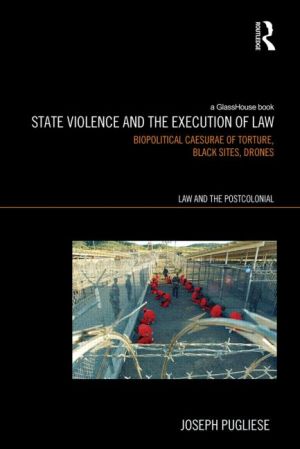
State Violence and the Execution of Law examines how law plays a fundamental role in enabling state violence and, specifically, specifically, torture, secret imprisonment, and killing-at-a-distance. Analysing the complex ways in which the U.S. government deploys law in order to consolidate and further colonial and imperial relations of power, Joseph Pugliese tracks the networks that enable the diffusion and normalisation of the state's monopoly of legitimate violence both in the U.S. and transnationally. He demonstrates how these networks of state violence are embedded within key legal institutions (US Department of Justice), military apparatuses (U.S. Defense Advanced Research Projects Agency), civic sites (McCarran airport, Las Vegas), corporations (Boeing), carceral architectures (CIA Salt Pit, Kabul, and Guantanamo), and advanced technologies (unmanned aerial combat vehicles).
Law's violence, it is maintained, is always preoccupied with the body: its torture, extortion or extermination. The exercise of state violence, it is argued, must be considered in situated locations that evidence the enmeshment of the body within geopolitical configurations of bio and necropower. For it is in these locations that law plays a foundational role in enabling and legitimising regimes of racialised violence. Drawing on poststructuralist, feminist, queer, critical legal, whiteness and anti-colonial theories, State Violence and Execution of Law brings into focus the contractual imbrication of the state with arms corporations and the contemporary military-industrial complex.